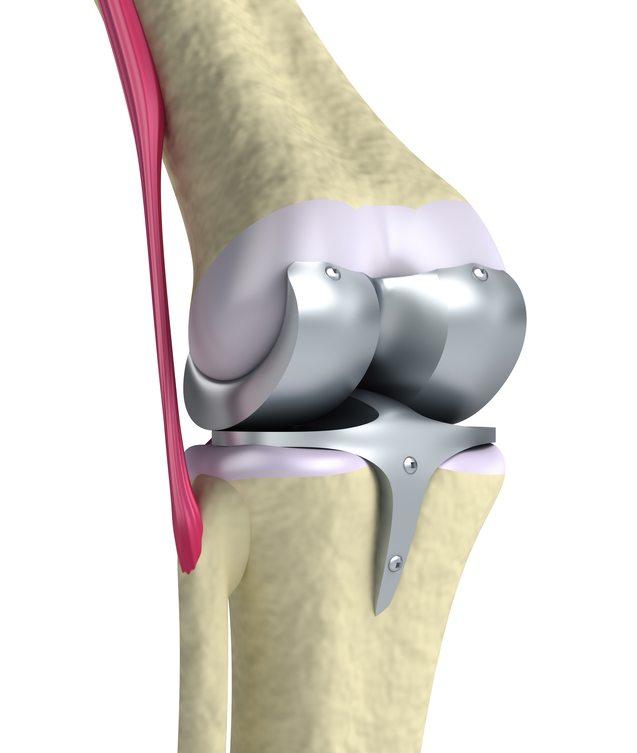Zimmer Knee Lawsuits
As of 2015, hundreds of people have filed lawsuits against the manufacturer of NexGen high-flex knee replacement products. These people’s knee implants failed prematurely, leading to unnecessary pain and other complications.
Why File a Zimmer Knee Replacement Lawsuit?
 Zimmer NexGen Flex Knee systems were meant to revolutionize knee replacements. But many people who received these devices experienced premature loosening of their device. When a knee replacement loosens, you can experience pain and instability. Oftentimes, a revision surgery is necessary to correct the loosening. Knee revision surgeries are complex and can lead to further complications such as a worsened range of motion.
Zimmer NexGen Flex Knee systems were meant to revolutionize knee replacements. But many people who received these devices experienced premature loosening of their device. When a knee replacement loosens, you can experience pain and instability. Oftentimes, a revision surgery is necessary to correct the loosening. Knee revision surgeries are complex and can lead to further complications such as a worsened range of motion.
Those who experienced loosening of their Zimmer NexGen Knee have filed lawsuits against the manufacturer for selling a product with design flaws and failing to properly warn consumers of the potential risks.
You may be eligible to file a lawsuit if you have experienced the following side effects from your Zimmer Knee replacement:
- Difficulty walking or standing
- Instability in the knee
- Persistent knee pain
- Swelling in the joint
- Revision surgery to correct a loose device
As the number of Zimmer Knee plaintiffs across the country has risen, these lawsuits have been consolidated to multidistrict litigation (MDL). This allows one court to evaluate many cases with the same legal questions, which often makes for speedier trials and settlements.
In a Zimmer Knee lawsuit, you may seek compensation for medical expenses, lost income, pain and suffering, and complications that could have been prevented.
Who Is Responsible for Zimmer Knee Replacement Complications?
 Plaintiffs filing Zimmer Knee lawsuits are holding the manufacturer accountable. In 2001, Zimmer Biomet developed and marketed the NexGen Flex line of knee replacements to people who wanted a greater range of motion in their new knee.
Plaintiffs filing Zimmer Knee lawsuits are holding the manufacturer accountable. In 2001, Zimmer Biomet developed and marketed the NexGen Flex line of knee replacements to people who wanted a greater range of motion in their new knee.
The company claims the NexGen Flex Knees are capable of 155 degrees of flexion while standard knee replacements typically offer about 125 degrees. But the high flex NexGen Knees have been linked to a higher incidence of early joint loosening.
Some legal complaints state that Zimmer wanted to expand its market at the expense of the consumer by marketing to younger patients and women with their gender-specific NexGen Flex Knee. Zimmer also marketed their products to doctors, telling them their knee replacements were safe.
Although the average knee replacement lasts 10 to 20 years, reports have shown Zimmer NexGen Flex Knees fail much sooner. A study published in the Bone & Joint Journalin 2007 reported that 21 percent of people with a NexGen Knee need revision surgery approximately 23 months after their initial surgery.
One woman sued Zimmer Biomet after her implants failed in both her knees. She had minimally invasive knee implant surgery in 2008, but her left knee failed in 2009 and her right in 2010.
Despite these failings, Zimmer had $1.9 billion in sales from its replacement knees in 2013.
Zimmer Biomet Voluntary Recalls
Zimmer has enacted several voluntary recalls of its knee replacements over the years. Although the recalls were voluntary, they highlight the potential risks of Zimmer’s high-flex NexGen Knees.
In 2010, the FDA recalled over 68,000 of Zimmer’s MIS Stemmed Tibial components. These components are often used with NexGen Flex Knee replacements.
In 2015, the company initiated a Class 2 recall of the persona trabecular metal tibial plate. Zimmer initiated the recall due to the increase in issues with loosening knee implants.
Zimmer Knee Replacement Litigation
 Zimmer Knee lawsuits are directed toward the manufacturer for the injuries and pain caused by the device. Plaintiffs charge Zimmer Biomet for marketing and selling defective products and insufficiently warning about the dangers. Some key issues highlighted in legal complaints against Zimmer Biomet include:
Zimmer Knee lawsuits are directed toward the manufacturer for the injuries and pain caused by the device. Plaintiffs charge Zimmer Biomet for marketing and selling defective products and insufficiently warning about the dangers. Some key issues highlighted in legal complaints against Zimmer Biomet include:
- Manufacturing, marketing and selling a defective product
- Causing unnecessary injury to patients
- Failing to adequately warn consumers of potential risks from loosening
- Risking the lives of patients who received NexGen Flex Knees and MIS Tibial Components
The most recent cases are part of multidistrict litigation (MDL) in Illinois although the cases originate from all over the country.
MDL is a type of litigation that consolidates lawsuits against a single defendant in regards to a single subject. In this case, the defendant is Zimmer Biomet, and the subject is the company’s liability for their NexGen Knee implant products. MDL is often beneficial for plaintiffs because their attorneys have more resources available from the pool of cases against Zimmer Biomet.
Over 1,000 plaintiffs have sued Zimmer Biomet for faulty or defective NexGen Knee replacements.Getting an Attorney Who Knows Zimmer Knee Replacements
 A knee replacement is typically the last resort when other therapies are no longer effective. Standard knee replacements have a good track record for reducing pain and improving mobility. Yet, Zimmer developed its NexGen high-flex knees in an attempt to expand its market base.
A knee replacement is typically the last resort when other therapies are no longer effective. Standard knee replacements have a good track record for reducing pain and improving mobility. Yet, Zimmer developed its NexGen high-flex knees in an attempt to expand its market base.
If you or a loved one had a knee replacement surgery that involved a NexGen high-flex product, you may be eligible for legal compensation if the device failed.
An attorney experienced with this type of litigation can increase your chances of getting compensation for lost wages, medical costs and the suffering caused by a Zimmer NexGen Knee.
Last Edited: November 1, 2017